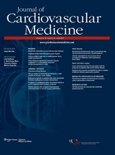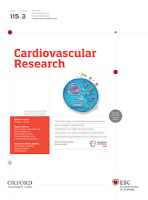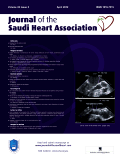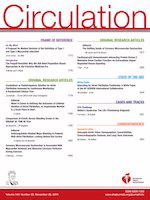
Journal of Cardiovascular Medicine
Scope & Guideline
Connecting Research and Practice for Heart Health
Introduction
Aims and Scopes
- Clinical Cardiovascular Research:
The journal publishes original research articles that investigate clinical aspects of cardiovascular medicine, including epidemiology, risk factors, and treatment outcomes. - Cardiovascular Imaging and Diagnostics:
There is a strong emphasis on advancements in imaging techniques such as echocardiography, cardiac MRI, and CT angiography, aimed at improving diagnostic accuracy and treatment planning. - Interventional Cardiology:
The journal covers the latest techniques and outcomes in interventional cardiology, including transcatheter procedures and device implantation, reflecting the rapid evolution of this field. - Heart Failure Management:
Research related to the management and treatment of heart failure, including pharmacological therapies and device-based interventions, is a core focus area of the journal. - Sex Differences in Cardiovascular Disease:
The journal frequently addresses the impact of sex on cardiovascular disease presentation, outcomes, and treatment responses, promoting a more personalized approach to cardiovascular care. - Emerging Therapies and Technologies:
The journal highlights research on new therapeutic agents, including SGLT2 inhibitors and novel anticoagulants, as well as innovative technologies in cardiovascular treatment.
Trending and Emerging
- Digital Health and Telemedicine:
There is a growing trend towards integrating digital health solutions and telemedicine in cardiovascular care, especially highlighted during the COVID-19 pandemic, which has prompted research on their effectiveness and implementation. - Precision Medicine in Cardiovascular Care:
Research focusing on personalized treatment approaches based on genetic, environmental, and lifestyle factors is emerging, aiming to tailor therapies to individual patient profiles. - Cardiovascular Effects of COVID-19:
The impact of COVID-19 on cardiovascular health has become a significant area of research, exploring the virus's effects on existing cardiovascular conditions and the long-term implications for patients. - Innovative Device Technologies:
The journal is increasingly publishing studies on new device technologies, including leadless pacemakers and advanced stent designs, reflecting the rapid advancements in interventional cardiology. - Risk Stratification Models:
There is a trend towards developing and validating new risk stratification models that incorporate diverse patient demographics and clinical characteristics to improve patient outcomes.
Declining or Waning
- Traditional Risk Factor Studies:
Research focusing solely on traditional cardiovascular risk factors, such as hypertension and cholesterol levels, has seen a decrease as the field shifts towards more complex models of cardiovascular risk that integrate genetics and lifestyle factors. - Basic Science Research:
There seems to be a waning interest in purely laboratory-based studies that do not directly translate to clinical practice, as the journal increasingly favors translational research with immediate clinical implications. - Invasive Surgical Techniques:
As minimally invasive techniques and transcatheter approaches gain popularity, traditional surgical methods for managing cardiovascular conditions are being reported less frequently. - Long-term Outcomes of Conventional Therapies:
Studies focusing on long-term outcomes of conventional therapies, such as older antiplatelet agents, are less common as newer therapies and their comparative effectiveness take precedence.
Similar Journals

Netherlands Heart Journal
Elevating Standards in Cardiology with Cutting-Edge FindingsNetherlands Heart Journal is a premier academic publication dedicated to advancing knowledge in the field of cardiology and cardiovascular medicine. Published by BOHN STAFLEU VAN LOGHUM BV, this journal has established itself as a critical platform for researchers, professionals, and students seeking to explore groundbreaking findings and innovative practices in cardiovascular health. With an ISSN of 1568-5888 and E-ISSN 1876-6250, the journal boasts a respectable Q2 ranking in the Cardiology and Cardiovascular Medicine category, placing it in the top half of its field according to the 2023 quartiles. The Scopus ranking places it 130th out of 387 in the relevant category, indicating a commendable percentile rank of 66th, which attests to its influence and quality of published research. Spanning from 2005 to 2024, the journal endeavors to include a diverse array of topics, encompassing clinical practice, technological innovations, and public health considerations related to cardiovascular diseases. Researchers and practitioners are encouraged to engage with the journal's robust content, contributing to and benefiting from the collaborative effort to enhance cardiovascular health worldwide.

REVISTA ESPANOLA DE CARDIOLOGIA
Transforming Cardiovascular Research into Real-World ImpactREVISTA ESPANOLA DE CARDIOLOGIA is a premier journal dedicated to the dynamic field of cardiology, published by EDICIONES DOYMA S A in Barcelona, Spain. With an impressive Q1 status in the Medicine (miscellaneous) category for 2023, this journal is recognized for its significant contributions to cardiovascular research, evidenced by its rank of #61 out of 387 in the Scopus database, placing it within the top 16% of journals in its field. Covering a broad range of topics within cardiology, the journal aims to disseminate high-quality research, clinical studies, and educational content, fostering knowledge sharing among researchers, clinicians, and students alike. While it does not currently offer open access, the journal maintains a commitment to advancing cardiovascular health through rigorous peer-reviewed articles. With a publication history that spans from 2013 to 2024, REVISTA ESPANOLA DE CARDIOLOGIA is an essential resource for those seeking to stay at the forefront of cardiology advancements and practices.

CARDIOVASCULAR RESEARCH
Advancing the frontiers of cardiovascular science.CARDIOVASCULAR RESEARCH, published by Oxford University Press, is a premier academic journal dedicated to the evolving field of cardiology and cardiovascular medicine. With a remarkable impact factor reflecting its significant contribution to the scientific community, this journal maintains a Q1 ranking in both Cardiology and Physiology categories, demonstrating its commitment to publishing high-quality research that influences clinical practices and healthcare outcomes. Established in 1967, the journal has consistently provided a platform for innovative studies and reviews, aiming to advance our understanding of cardiovascular physiology and pathology. Researchers, professionals, and students will find published articles crucial for their work, as the journal covers a broad spectrum of topics including molecular biology, genetics, and clinical studies. While currently not offering open access options, CARDIOVASCULAR RESEARCH remains accessible through institutional and individual subscriptions, ensuring that the latest findings are available to those in the cardiovascular science community.

Minerva Cardiology and Angiology
Exploring the frontiers of cardiology and vascular science.Minerva Cardiology and Angiology, published by EDIZIONI MINERVA MEDICA, is a prominent journal in the field of cardiology and cardiovascular medicine, with an ISSN of 2724-5683 and E-ISSN of 2724-5772. Established in 2021, this journal aims to foster the dissemination of cutting-edge research, clinical practice guidelines, and innovative methodologies relevant to cardiovascular health. As of 2023, it holds a commendable Q3 quartile rank in its category, reflecting its growing influence within the scientific community. The journal is indexed in Scopus, where it ranks #221 out of 387 in its field, placing it in the 43rd percentile overall. Although it currently does not offer Open Access options, articles published in Minerva Cardiology and Angiology contribute significantly to ongoing discussions and advancements in heart and vascular health. The journal serves as an invaluable resource for researchers, healthcare professionals, and students seeking to stay informed on the latest developments in cardiology.

CANADIAN JOURNAL OF CARDIOLOGY
Empowering Cardiovascular Innovations Through Rigorous ResearchCanadian Journal of Cardiology (ISSN: 0828-282X, E-ISSN: 1916-7075), published by Elsevier Science Inc, serves as a vital platform for disseminating high-quality research in the dynamic field of cardiology and cardiovascular medicine. Since its inception in 1985, this journal has established itself as a leader in the field, currently holding a prestigious Q1 ranking in Cardiology, indicating its significant impact and contribution to medical science. With a Scopus rank of #50 out of 387 in its category and placing in the 87th percentile, the journal showcases rigorous peer-reviewed articles that advance knowledge and practice in cardiology. Although the journal is not open access, it provides valuable insights and research findings that cater to clinicians, researchers, and students who are committed to improving cardiovascular health. As we approach the convergence of years to 2024, the Canadian Journal of Cardiology continues to strive for excellence, facilitating a discourse vital for both academic and clinical advancements in cardiology.

TRENDS IN CARDIOVASCULAR MEDICINE
Exploring Innovative Pathways in CardiologyTRENDS IN CARDIOVASCULAR MEDICINE, published by Elsevier Science London, stands at the forefront of the cardiology field, with a commendable Q1 ranking in the category of Cardiology and Cardiovascular Medicine. Since its inception in 1991, this esteemed journal has provided a vital platform for disseminating cutting-edge research and innovative clinical practices, reflecting the dynamic developments in cardiovascular health. With an impact factor positioning it among the top 3% in its category, TRENDS IN CARDIOVASCULAR MEDICINE is essential reading for researchers, healthcare professionals, and students pursuing the latest advancements and evidence-based approaches in cardiology. Although this journal does not currently operate under an open-access model, its rich array of content encompasses a variety of topics from clinical studies to reviews, ensuring readers stay informed on the pivotal trends that shape cardiovascular medicine. This commitment to excellence underscores the journal's role as a premier resource for anyone dedicated to improving cardiovascular health.

ARCHIVOS DE CARDIOLOGIA DE MEXICO
Connecting the global community of cardiovascular specialists.ARCHIVOS DE CARDIOLOGIA DE MEXICO is a premier open-access journal dedicated to advancing research and clinical practice in the field of cardiology and cardiovascular medicine. Published by the Instituto Nacional de Cardiología Ignacio Chávez since 2001, this journal offers a valuable platform for the dissemination of high-quality, peer-reviewed articles that span diverse aspects of cardiovascular health. With its current categorization in the fourth quartile (Q4) of cardiology journals and a Scopus rank of #319 out of 387, ARCHIVOS DE CARDIOLOGIA DE MEXICO is positioned within the dynamic landscape of cardiovascular research, presenting opportunities for both emerging and established voices in the field. It aims to promote discussion and innovation across various topics in cardiology, making it a crucial resource for researchers, healthcare professionals, and students keen on keeping abreast of developments in cardiovascular science. Accessible online since 2009, this journal fosters collaboration and knowledge sharing among specialists worldwide, establishing itself as a significant contributor to the global discourse on heart health.

Journal of the Saudi Heart Association
Pioneering Insights in Cardiovascular Medicine Since 2009The Journal of the Saudi Heart Association is a prominent scholarly publication dedicated to advancing knowledge in the fields of cardiology and cardiovascular medicine. Published by DIGITAL COMMONS BEPRESS, this open-access journal has been serving the global community since 2009, providing a vital platform for researchers, practitioners, and students interested in the latest developments in heart health and disease management. With an ISSN of 1016-7315 and a growing repository of knowledge alongside an E-ISSN of 2212-5043, the journal showcases an array of peer-reviewed articles that contribute to the understanding of cardiovascular conditions. Although categorized in the Q4 quartile for 2023, it remains committed to offering valuable insights, particularly within the constraints of the 29th percentile rank specified by Scopus. As the journal converges towards 2024, it continues to foster collaboration, innovation, and inquiry within the Saudi Arabian and international medical communities.

CIRCULATION
Advancing Cardiovascular Insights, One Beat at a Time.CIRCULATION is a premier journal in the field of cardiology and cardiovascular medicine, published by Lippincott Williams & Wilkins. With a distinguished history dating back to 1950, the journal has consistently been at the forefront of critical research, showcasing significant advancements and discoveries in cardiovascular health. It holds a remarkable Q1 ranking in both the fields of Cardiology and Physiology (medical) according to the 2023 category quartiles, demonstrating its influential role among the top publications in these disciplines. With an impressive Scopus ranking, placed 3rd out of 387 in Cardiology and 2nd out of 113 in Physiology, CIRCULATION is essential reading for researchers, practitioners, and students passionate about advancing their understanding of heart health and related medical sciences. Although the journal is not open access, it continues to foster scholarly exchange and innovation in cardiovascular research, making it an indispensable resource for quality insights and groundbreaking studies.

Frontiers in Cardiovascular Medicine
Advancing Cardiovascular Knowledge for a Healthier Tomorrow.Frontiers in Cardiovascular Medicine is a leading open-access journal published by FRONTIERS MEDIA SA, dedicated to advancing research in the field of cardiology and cardiovascular medicine. Since its inception in 2014, the journal has become a vital platform for the dissemination of high-quality research, boasting a commendable Q2 rank in the 2023 category for Cardiology and Cardiovascular Medicine. With a focus on promoting innovative studies and clinical insights, Frontiers in Cardiovascular Medicine facilitates open access to its content, allowing researchers, healthcare professionals, and students from around the globe to engage with the latest findings which are critical for the advancement of cardiovascular health. The journal's significant presence in the academic landscape, as indicated by its Scopus ranking (161/387 and 58th percentile), underscores its importance as a research outlet in this essential field. Located in Lausanne, Switzerland, the journal continues to support the global cardiovascular community by encouraging collaboration and knowledge sharing to address the challenges faced in cardiovascular medicine today.